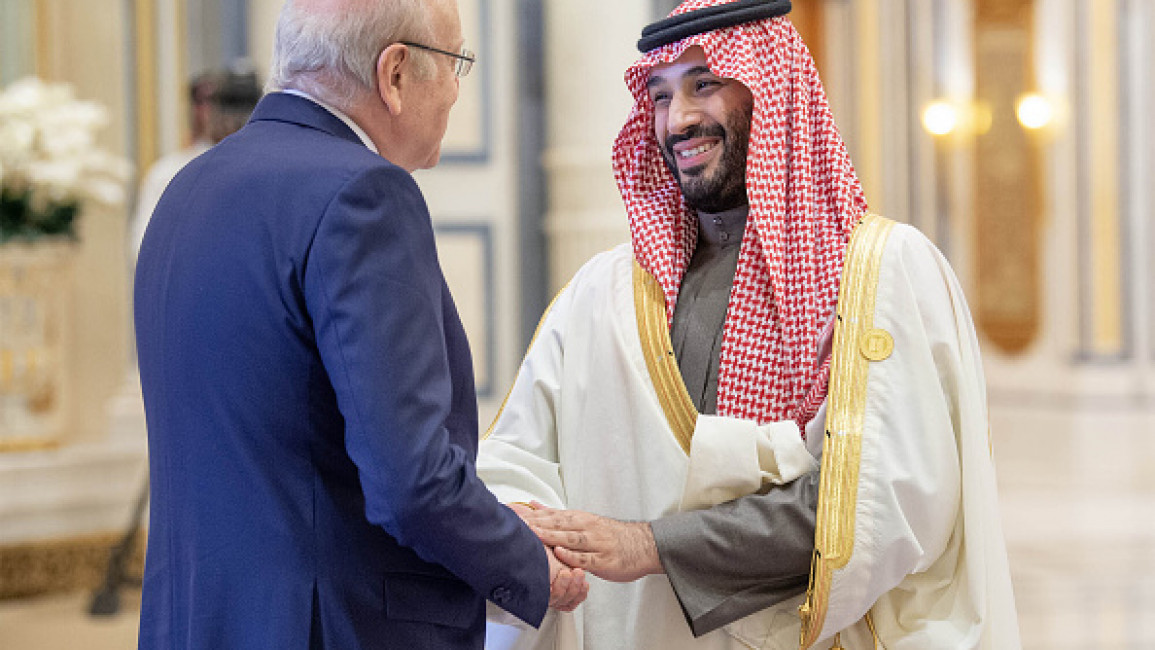Explainer: Will the Gulf help fill Lebanon’s presidential vacancy?
As Lebanon approaches its second month without a head of state, its leaders have been flying to Gulf capitals, stirring intrigue.
The head of Lebanon’s Armed Forces, Joseph Aoun, was welcomed in Doha on 10 December. A few days before, Lebanese Prime Minister Najib Mikati was in Riyadh for the Arab-Chinese summit.
The Gulf has historically played a large role in Lebanese politics, especially in times of political deadlock. Particular Gulf states, like Saudi Arabia, have channeled their interests through politicians and parties such as Saad Hariri and now the Lebanese Forces.
Lebanese political factions are acutely aware of the Gulf’s priorities in Lebanon, with the head of the Lebanese Forces Samir Geagea warning that an unsuitable president would cause Saudi Arabia to cut off aid to the country.
Others, like the Maronite Patriarch, have openly called for the “internationalisation” of Lebanon’s political problems.
“Throughout its history, Lebanon’s president was never elected democratically. His election was always the result of a modus vivendi between regional and international powers,” Karim Emile Bitar, a professor of international relations at the University of Saint Joseph Beirut, told The New Arab.
Domestically, Lebanon is at a complete deadlock over the election of a new president. After ten rounds of voting, no clear frontrunner has emerged.
In the past, Lebanon has been able to look towards the Gulf to break domestic political deadlock. But will the Gulf step in this time?
Does the Gulf still care about Lebanon?
Lebanon’s relations with the Gulf are not what they used to be. Lebanon’s downtown is now empty of the throngs of Gulf tourists it used to attract, with their respective governments warning them against travel to the Mediterranean destination.
Four Gulf countries cut off relations with Lebanon in November 2021, after then-Information Minister made comments opposing Saudi Arabia and the UAE’s involvement in the Yemeni civil war.
At the root of the breakdown in relations was the outsized influence the pro-Iran militia Hezbollah played in Lebanese politics. Saudi Arabia has expressed that it will not support Lebanon as long as the group dominates the country’s political establishment.
However, both Saudi Arabia and Iran are currently preoccupied with their own internal struggles.
Saudi Arabia’s economic and social transformation is demanding the full attention of its leaders, while Iran is struggling to quell growing protests.
Internal problems could lead to a detente between the regional arch-rivals and in turn, more willingness to compromise abroad, such as in Lebanon.
“The [Saudis] want to focus on their economy. So, the Saudis are turning away from a dogmatic foreign policy approach to a more pragmatic one,” Hilal Khashan, a professor of Political Science at the American University of Beirut, told The New Arab.
The two most likely presidential candidates for Lebanon currently are army chief Aoun and pro-Hezbollah candidate Suleiman Frangieh.
Aoun has good relations with western countries and the Gulf, as well as a perceived lack of involvement with the corruption that plagues the Lebanese state. Frangieh is an MP that is close to Syria and that Hezbollah knows will be friendly to its interests.
Thus far, neither political axle seems keen to compromise on their preferred candidate.
Some analysts are doubtful, however, that the Gulf is willing to invest the political capital necessary to bridge the gap between Lebanon’s domestic political actors.
“I don’t see the Saudis, Emiratis, Kuwaitis, Omanis or even the Bahrainis interested. The Gulf is focusing on their own economies … Lebanon is not high on their priority list,” Randa Slim, a Senior Fellow at the Middle East Institute, told The New Arab.
Even if they were willing to exercise their own influence in Lebanon, it is possible that Gulf countries would not be able to bring Lebanese political actors to the negotiating table.
“The political stakeholders in Lebanon might not be ready. The local actors in Lebanon, the five or six men have their own cost benefit calculi. So they have to come around to a consensus that it’s time to solve the situation,” Slim said.
Can Doha broker a deal?
In 2008, when armed clashes broke out between Hezbollah and pro-Hariri parties in Beirut, Lebanese leaders were quickly flown out to Doha. The negotiations, overseen by the Qataris, resulted in the Doha Accords, solving the year-long political deadlock and restructuring Lebanon’s electoral system.
Lebanon’s current gridlock is nowhere near what it was in 2008, but it is possible that Doha is once again trying to play the role of mediator.
“This is to solidify their reputation as a mediator in the region. As the West … moves away from the Middle East … a regional player fulfilling that role will be appreciated in western capitals,” Slim said.
Doha has been instrumental in acting as a go-between for western powers and regional actors, such as the Taliban and the Iranians in the context of the nuclear negotiations.
Doha being on good terms with both the West and the Iranians makes it well positioned for forging compromises in Lebanon.
It is likely that Doha is still in the “surveying stage” of its meditations, Slim said. She added that it is likely to be trying to get a feel for the priorities of Lebanese political actors and a potential presidential candidate.
However, it is likely that political parties will be more likely to come to a compromise as Lebanon’s political and economic situation deteriorates in the absence of a government.
It remains to be seen whether or not the country will need the Gulf’s assistance to come to such a compromise.



